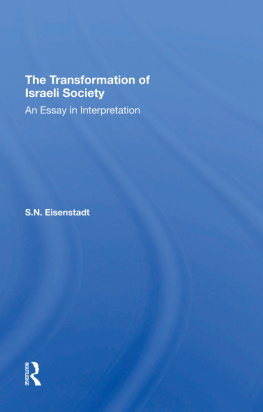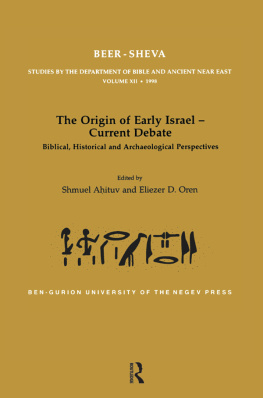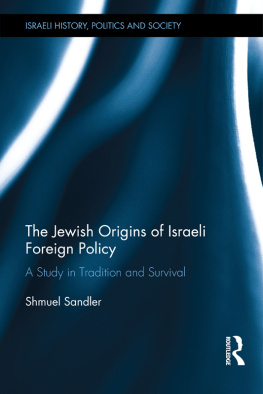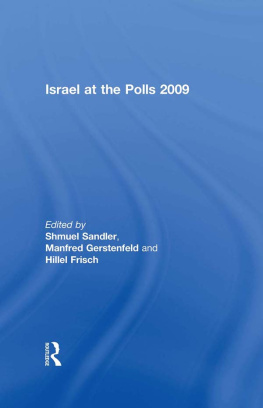First published 1985 by Westview Press
Published 2019 by Routledge
52 Vanderbilt Avenue, New York, NY 10017
2 Park Square, Milton Park, Abingdon, Oxon OX14 4RN
Routledge is an imprint of the Taylor & Francis Group, an informa business
Copyright 1985 by S. N. Eisenstadt
All rights reserved. No part of this book may be reprinted or reproduced or utilised in any form or by any electronic, mechanical, or other means, now known or hereafter invented, including photocopying and recording, or in any information storage or retrieval system, without permission in writing from the publishers.
Notice:
Product or corporate names may be trademarks or registered trademarks, and are used only for identification and explanation without intent to infringe.
LC 85-51253
ISBN 13: 978-0-367-29666-7 (hbk)
This book, although close in title and to some degree in contents, is not an updating of my Israeli Society, but basically, with the exception of some descriptive parts, an almost entirely new book.
It does not intend, as the former one, to present a detailed picture of the development and organization of the major spheres of life of Israeli society. Rather, its major aim is to analyse - in the vein of a long interpretative essay, yet an essay based on data - some of the major aspects and trends of development of Israeli society which have been taking place continuously since its beginning, from the early period of Zionist settlement in Eretz Israel up to today.f It analyses these processes and changes in a comparative-analytical framework. It stresses that Israel has to be seen as a modern post-revolutionary society similar in some ways to other such modern societies - be they the United States, Russia or Mexico - and yet also quite different from them, and it is the juxtaposition of these similarities and differences that provides the crucial clue to the dynamism of Israeli society.
The first such specific characteristic of the Yishuv and of Israeli society is that it developed as a colonizatory, pioneering and ideological society, rather akin to the puritan settlement in North America.
The second distinctive characteristic of Israeli society is that its development took place in the reality of an alien, later quite hostile, environment, which has made the security dilemma a central one in the construction of life in Israel.
The third - and in a way perhaps most distinctive - characteristic of Israeli society, which distinguishes it from those of other such societies, is that its origins are rooted in attempts to reconstruct Jewish national life, Jewish civilization - as articulated in the Zionist vision.
Accordingly, in order to understand the dynamics of Israeli society, we have to take into account the whole background of Jewish history in the framework of which the Zionist movement developed. Within this framework the Zionist movement constituted also a rebellion - thus creating the revolutionary component of this society. This rebellion has, at the same time, taken up, continued and reconstructed many of the elements of the premisses of the Jewish civilizational vision - one of the first such visions to develop in the history of mankind, and the first on the eastern shores of the Mediterranean and among the monotheistic religions.
The fourth such distinguishing characteristic of Israeli society is the fact of its being a small society - sharing many characteristics with other small modern societies, but at the same time, because of the attempt at the implementation of the Zionist vision, aspiring to become a centre of special cultural creativity, closely related to this vision. Hence the crucial importance of the analysis of the relations between Israeli society and the Jewish communities in the Diaspora, which constitute one of the major objects of this special creative vision, one of its major external markets with which all small societies are very closely interrelated, and towards which Israeli society has developed a great variety of relations, ranging from rebellion through ambivalence up to acceptance as sources of various types of support.
Throughout our analysis we have attempted to provide an interpretation of the dynamics of Israeli society in light of these comparative, analytical considerations.
Accordingly the book contains two topics which were not included in Israeli Society. First, the book starts not only with the analysis of the specific historical background of the Zionist movement, but with an overview, an interpretation, of Jewish history.
Second, the book also contains a special chapter on developments in Jewish communities in the Diaspora - as they share with Israel, even if in a very fraught and ambivalent relation, some of the problems of implementation of such a vision in the context of modern life.
The book does not pretend to present a history of the Jewish people or even of the Zionist movements, of the settlement in Eretz Israel or of the State of Israel itself. There are by now many books - presented in the bibliography which deal with these topics; but rather, as indicated, it attempts to provide an interpretation from the point of view of the analytical considerations outlined above.
Given the nature of the work, I have given only minimal footnotes - mostly references to direct quotations or sources - in the text, and at the same time have provided general bibliographical indications at the end of the book.
The interpretation attempted in this book could not, however, be attempted without relying on very diversified and abundant historical, sociological and anthropological research - even if some rather severe lacunae can sometimes be found in many areas of such research.
Jewish historical research has indeed burgeoned in the last four decades and has become very extensive. I was fortunate to be introduced to it by my teachers at the Hebrew University - the late Professors Itzhak Baer and B. Dinur, pioneers in the modern Eretz-Israeli Jewish historiography - as well as to follow closely the work of the late Professor Gershon Scholem, who has pioneered the work of Jewish mysticism. I am also especially indebted to the work of my colleague Professor J. Katz and his innovative works on Jewish history in general and to his modern one in particular, as well as, of course, to the many works of younger scholars in Israel and abroad.
I owe also a great debt to Arnaldo Momigliano - to many of his works which (as for instance in Alien Wisdom) add some crucial dimensions in the understanding of Jewish civilizations in late antiquity, and to many conversations with him.
The same is obviously true of comparative studies and approaches which have been at the centre of my work in sociological analysis in general. Here I am greatly indebted to my late teachers, the late Professor Martin Buber and Professor R. Koebner, as well as to the late Professor M. Ginsberg, for raising my interest in this direction, to Professor Edward Shils for our continuous dialogue ranging by now for more than thirty-five years, and to many of my colleagues, contemporaries and students for continuous stimuli and cooperation in these directions of sociological analysis.









